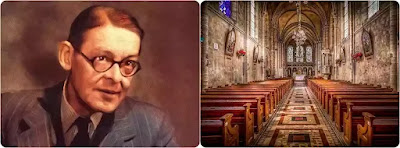Also Read
Eliot's use of the Chorus in Murder in the Cathedral has found unanimous praise from readers and critics. Indeed, as Helen Gardner puts it, the real drama of the play is to be found in the chorus, where also lies its greatest poetry." Eliot does not copy all the Greek conventions in drama, but he uses one convention, namely the Chorus, to good effect. As he says, its function has always been to mediate between the action and the audience, intensifying the action by projecting its emotional consequences, so that we, as the audience, see it doubly, by seeing its effect on other people." This accords well with Eliot's conception of poetic drama having a sort of "doubleness of action." Thus he restores the full-throated Chorus of the ancient Greek tragedy after years of neglect, and he has been immensely successful in his effort.
Eliot, however, gives an original touch to the convention, - he invests the Chorus with a new significance in the light of the Christian dispensation. In Murder in the Cathedral, the Chorus is more individualized compared, for instance, to the Aeschylus Chorus.
The function of the chorus is also widened by Eliot. The Chorus in this play is also the Christian Choirs, as R. William says - it is the "articulate voice of the body of worshippers." It functions both as the Christian liturgy and as a means of religious instruction. By far, the most important role of the Chorus is in its development of the action. It is an integrating factor - it comments, criticizes and reforms; what is more, it develops in the course of the action. The poor women of the Chorus are prototypes of all those who, throughout the ages will come to implore help from the hero-saint, the Christian equivalent of the ritual mourners, weeping for the dead god or hero. But his play transcends its origin and occasion and the Chorus becomes humanity, confronted by the mystery of iniquity and the mystery of holiness."
The Chorus in their speeches reflects the course of the action of the play. As Helen Gardner remarks, "the fluctuations of the Chorus are the real measure of Thomas's spiritual conquest."
The Chorus is composed of poor women who describe themselves as small folk drawn into the pattern of fate. The small folk who live among small things." They intuitively fear that some disaster is about to happen which would prove too heavy for them to face. They fear the "disturbance of the quiet seasons", the turmoil bringing a sense of the unknown into their familiar, carefully ordered routine. They would prefer to "pass unobserved."
In the beginning they fear the consequence of Becket's return from exile. Thy appeal to him to return to France. They identify their spiritual welfare with that of Thomas as the Tempters assail Thomas. As Part II opens, they have reached the stage where they admit the need for Becket's sacrifice, but they are horrified and ashamed at their own part in the pattern - their implicit consent in standing by and not preventing the killing of Becket. They have a vision of horror as the martyrdom approaches. With the murder of Thomas, the terrible action is consummated. The women can no longer "pass unobserved" on the circumference of the Wheel of being. But by the end of the play they have realized the significance of the "murder" of Thomas.
The darkness, the women affirm at the end, "declares the glory of light." Thus in their final Chorus, they express their new vision, their sacrifice of Christ renewed in the martyrdom of Thomas. All contradictions are resolved and re-integrated into a grand image of the eternal design. This new vision completes what Thomas has called "the figure of God's purpose." In them, as in Becket, a right attitude to martyrdom is developed - completing the denouement of the play. The motivation of Thomas and the reactions of Chorus are two things that, between them, make up the real kernel of the play.
University Questions also can be Answered:
Q. Discuss the use of the Chorus by Eliot in Murder in the Cathedral.
Or
Q. What dramatic purpose does the Chorus serve in Murder in the Cathedral?
Or
Q. What part does the Chorus play in Murder in the Cathedral?
Or
Q. "We have to go back to Greek tragedy to find choral writing with which to compare the best of the choric speeches in Eliot's play." Discuss with reference to Murder in the Cathedral.
Or
Q. Trace with suitable illustrations, the extent to which the views and emotions of the Chorus undergo transformation in the course of the play, Murder in the Cathedral.
Or
Q. The real drama of the play is to be found, in fact where its greatest poetry lies-in the Chorus." Discuss with reference to Murder in the Cathedral.
